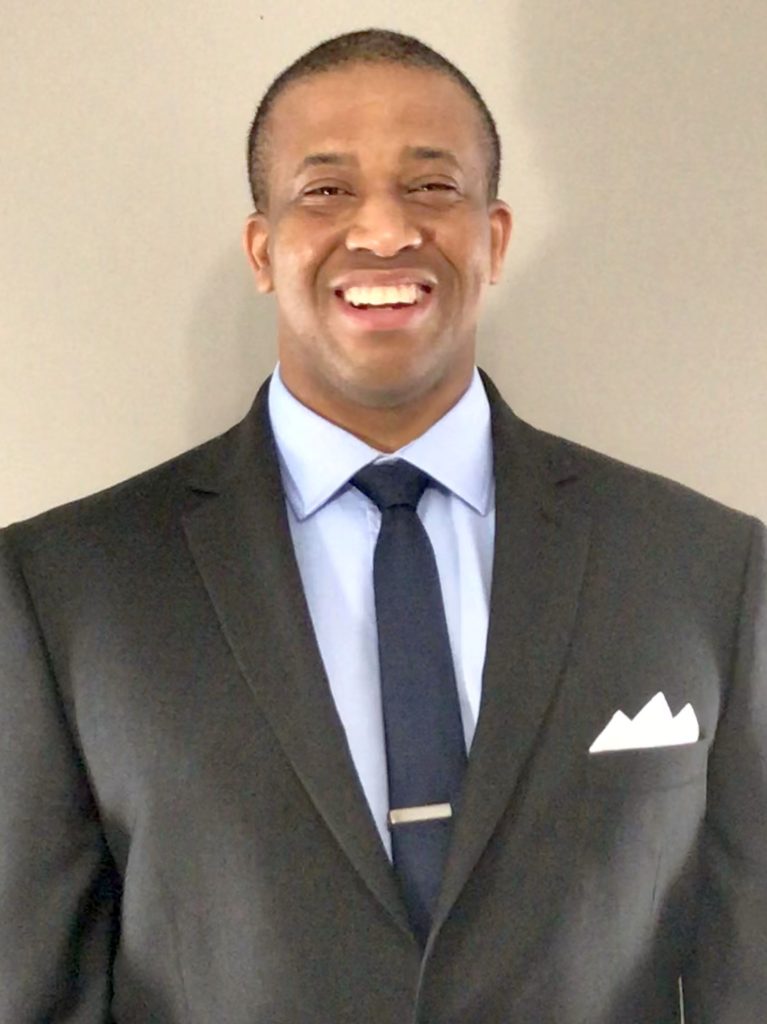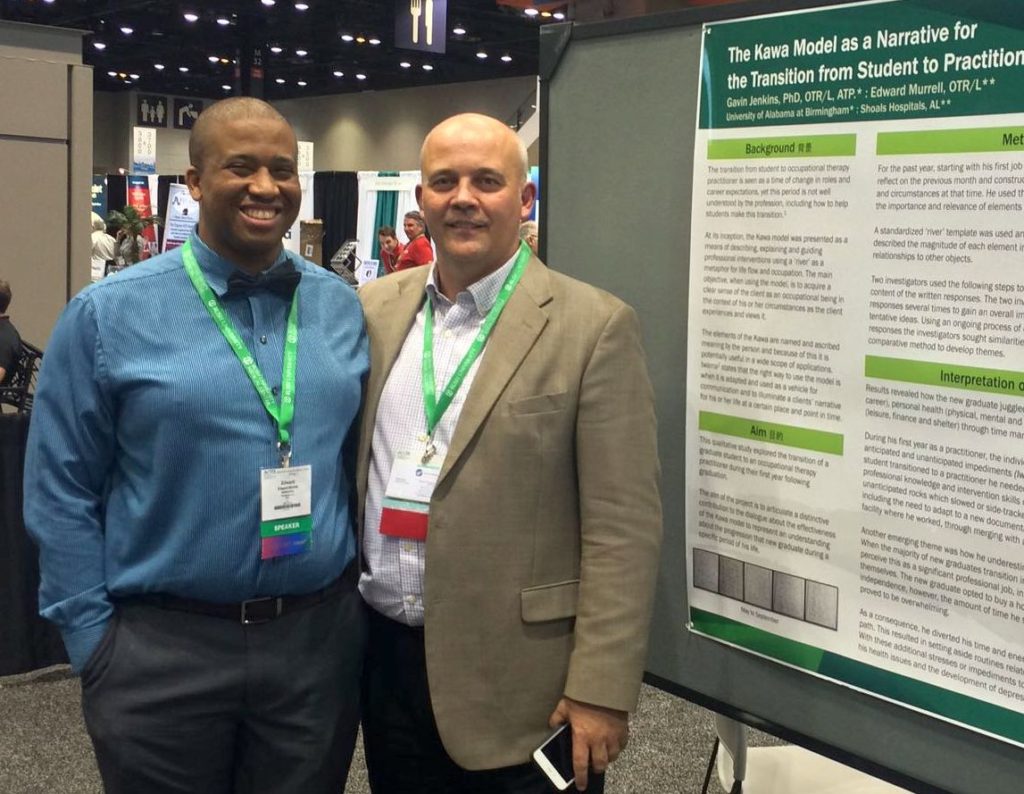Today MindWorks Collaborative is highlighting an ambitious and fairly new occupational therapist of color, James “Edward” Murrell. Based in Birmingham, Alabama, Edward finds growth and fulfillment by working as an occupational therapist with two different agencies that allow him to provide wrap-around supports to his clients. He knows OT services are most effective with holistic approaches that combine the physical, psychological, and cognitive aspects of a person and their relationship with the environment and activities. This helps them to quickly return and stay home, increase independence, and/or to participate in something they never thought was possible again.

WHAT Is Edward Up To?
Edward is a traditionally trained special education teacher. He leverages his experiences as a teacher to accurately find client skill gaps and listen to their hopes/desires to build comprehensive and individually responsive therapy plans. He values his time as a teacher and notes that a “teaching” seed was planted during his experience that has grown into a desire to educate future occupational therapists, particularly supporting those of color. This desire has shown up in his decision to pursue and accept admission into the PhD program in Health Services Program Administration at the University of Alabama at Birmingham with the goal of becoming an occupational therapy professor and health services researcher. Edward looks forward to expanding his knowledge and skills with advanced studies in the administrative processes that often impact marginalized communities the most within healthcare. In the future, as a health services researcher and occupational therapy educator, he hopes to use his research to support the value of occupational therapy and to continue to improve patient care, in conjunction with educating future occupational therapists.
Why is equity important in Occupational Therapy?
Edward strongly believes that the representation of various identities in the OT field is of paramount importance because having diverse voices like his are the only way for the mission and vision of the field to continue to expand and grow it’s inclusiveness and sustainability. For a long time, he felt like he was too “white” for black people and too “black” for white people, which left him feeling displaced and isolated in his own communities and profession. He eventually learned to get comfortable in his own intersectional skin and to separate interests, tastes, and attributes from race and acknowledging them solely as pieces of his collective self. He recognizes that his skin color is a determinate factor in many of his work experiences but now celebrates that his identities are what makes him valuable to the field. He brings a unique background, story and life experience. When used in conjunction with the skills he learned in what OT’s refer to as ‘therapeutic use of self’, Edward is not only able to better help those with similar backgrounds and experiences, but he also has the opportunity to educate and share his knowledge and experiences with those that differ from his own.
He adds that working in various rehabilitative settings has shown him that his patients’ quality of care and outcomes are not only affected by his ability to provide evidenced-based treatments, but also by socioeconomic inequalities, low health literacy, and more. Edward learned that the health community greatly lacks research on disparities in health and healthcare as it relates to occupational therapy. This need, combined with his own identity background, has led to his interest in the specialization of health services research, with the hope of continuing to prove the value of Black male OT’s within the health care community as well as improving care for patients.
Please help MindWorks to celebrate the future Dr. Edward for his dedication to the field and his community and for his vulnerability in sharing his story with all of us! Read more about him below and connect with him on LinkedIN.

Get to know Edward:
Name:
James “Edward” Murrell, MS OTRL
Title and Organization:
Occupational Therapist at Select Medical and Genesis Healthcare
Hobbies/Interests:
I enjoy woodworking, am an avid music listener, engaging in performing arts, and traveling
Education Background:
University of Alabama at Birmingham – Current doctoral student; Master of Science in Occupational Therapy; Bachelor of Science in Collaborative Special Education, K-6 with mathematics minor
When did you start working in OT?
I have been working in occupational therapy for the last 4 years
Why did you choose to become an Occupational Therapist?
In January, 2008, I re-enrolled into college thinking I wanted to complete my degree in Electrical Engineering. However, I had been learning American Sign Language for the past 2 years and a friend persuaded me to come use that skill and work as a summer Camp Counselor at Camp Courage in Minnesota. I spent 3 months helping adults and children with physical impairments, deafness/hearing impairments, Hemophilia, and/or Autism engage in self-care, play and leisure outdoor activities. When I returned home to Alabama, I was talking to a friend about how much I had enjoyed the experience and she strongly suggested I look into occupational therapy. After talking to some therapists and looking into the field, I realized I had an opportunity to seek a career that not only earned a living, but could also be intrinsically fulfilling. I changed my major to special education with the goal of applying to graduate school to become an occupational therapist. I was drawn to the holistic approach of addressing the physical, psychological, and cognitive aspects of a person to help them function in all environments, not just in school, and participate in everyday activities.
Can you share a bit about what makes your job so rewarding?
A part of my job that I love and embrace with passion is activity analysis – the process of breaking down an activity into steps and detailed sub-parts, and examining its components and other factors that influence performance and engagement in an activity. This often involves activities and tasks most of us do everyday without a second thought, i.e. taking a shower. I then use my clinical reasoning and skills to provide treatment to help someone reach their goals. This might mean using techniques to increase motor control, assistive device training, modifying the environment, simplifying a task, etc. Even when there are seemingly impossible challenges – such as lack of resources, limited time, patients’ financial limitations, etc., I find that it is not only rewarding, but also that there is a beauty in helping people overcome these obstacles to return home, become more independent, and/or reengage in an activities that they thought they would never be able to do again.
How would you describe a good day at work?
I work mostly with adults and seniors with various levels of medical complexity, at different stages of rehabilitation – from acute injury to maintaining function. One time I treated a middle-aged adult female who had been admitted to inpatient rehabilitation after experiencing a fall with a subsequent hip replacement, which meant no bending past 90 degrees at the hip. She expressed to me that what she wanted most was to be able to shave her own legs. We devised a device to attach a razor, practiced shaving, and made final adjustments until she was prepared to safely shave her legs independently. On the day she discharged home, she was elated. When asked why, she held up the device and proudly stated that she could finally shave own her legs and it was first thing she planned to do when she arrived home. While it comes in many forms, this story illustrates what a good day consists of at work.
Anything else you would like to share about your job/experience of working in OT?
The use of occupations, or meaningful and purposeful activities, to enable people to participate in the activities of everyday life is part of the foundation of my profession, an aspect I love; however, we are also tasked with rehabilitating people within structures of administrative processes and policies to produce outcomes that benefit both stakeholders and patients.


Recent Comments